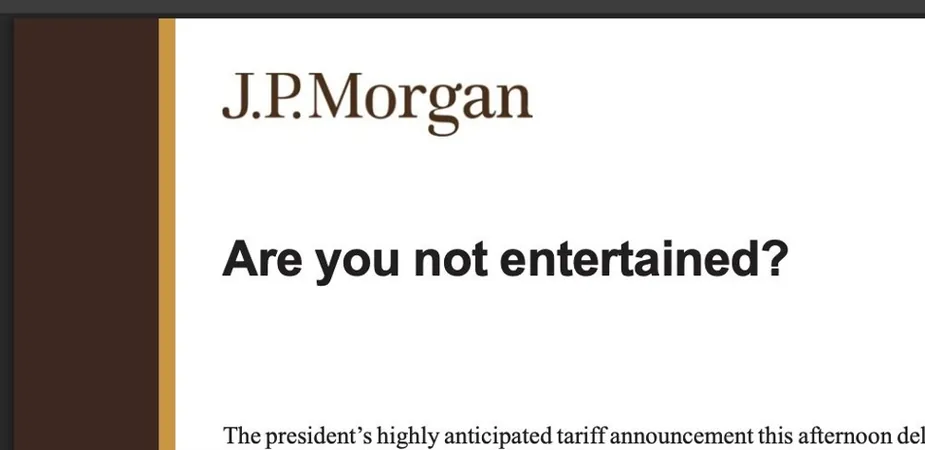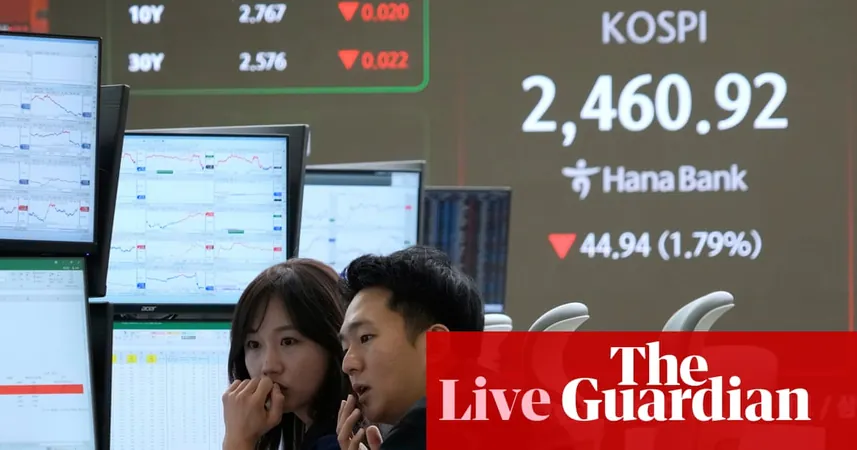
JPMorgan Warns Trump Tariffs Could Trigger Major Economic Turmoil: Is a Recession on the Horizon?
2025-04-03
Author: Noah
Introduction
In a stark warning on Wednesday, economists at JPMorgan highlighted that the newly announced tariff measures could significantly disrupt the U.S. economy, raising the specter of a possible recession in the near future. The sweeping tariffs, estimated to generate nearly $400 billion, represent approximately 1.3% of the Gross Domestic Product (GDP) and are being characterized as the largest tax increase since the Revenue Act of 1968.
Impact on Personal Consumption and Inflation
JPMorgan's analysis suggests that these tariffs could cause personal consumption expenditures (PCE) inflation to rise between 1.0% and 1.5% by 2025. This increase in consumer prices is expected to be most pronounced in the second and third quarters of the year. Such inflationary pressures would significantly erode household purchasing power, risking negative growth in real disposable income—a crucial factor for American families.
Effects on Consumer Spending and Economic Growth
As households feel the pinch from rising prices, real consumer spending—a vital engine for economic growth—might contract, pushing the economy closer to recessionary conditions. This alarming scenario underscores the interconnectedness of price pressures and consumer behavior, vital drivers of the U.S. economy.
Export Declines and Business Investment
Moreover, JPMorgan pointed out that these projections do not take into account potential declines in exports or reduced business investments—both of which are expected to come under strain. Reports of retaliation from U.S. trading partners have surfaced, adding layers of uncertainty and increasing the risks of further economic fallout.
Impact on Business Investment and Economic Sentiment
The bank emphasized that the lack of clarity regarding the implementation and duration of the tariffs could dampen business sentiment and lower capital expenditure, which are already weakening due to tightening financial conditions. Although some investment pullback could potentially help address the savings-investment gap and the current account deficit, JPMorgan cautioned that any short-term economic losses could overshadow these possible long-term benefits.
Conclusion and Future Outlook
As the situation unfolds, JPMorgan has indicated that it will reassess its forecasts later this week, seeking to provide more accurate predictions as further details surrounding the tariffs and their global repercussions become available. The economic stakes are high, and both policymakers and investors will be watching closely as this scenario develops. Could these economic challenges lead to an unexpected recession? Only time will tell!









 Brasil (PT)
Brasil (PT)
 Canada (EN)
Canada (EN)
 Chile (ES)
Chile (ES)
 Česko (CS)
Česko (CS)
 대한민국 (KO)
대한민국 (KO)
 España (ES)
España (ES)
 France (FR)
France (FR)
 Hong Kong (EN)
Hong Kong (EN)
 Italia (IT)
Italia (IT)
 日本 (JA)
日本 (JA)
 Magyarország (HU)
Magyarország (HU)
 Norge (NO)
Norge (NO)
 Polska (PL)
Polska (PL)
 Schweiz (DE)
Schweiz (DE)
 Singapore (EN)
Singapore (EN)
 Sverige (SV)
Sverige (SV)
 Suomi (FI)
Suomi (FI)
 Türkiye (TR)
Türkiye (TR)
 الإمارات العربية المتحدة (AR)
الإمارات العربية المتحدة (AR)